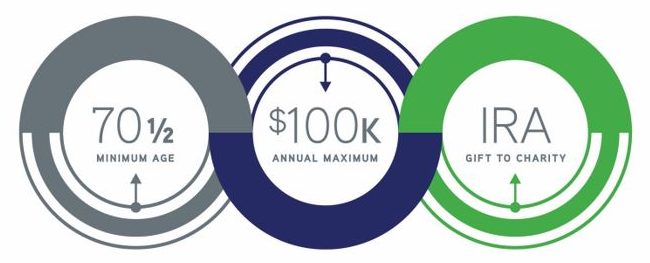With recent legislative updates, charitable giving with IRAs has become even more advantageous. As such, we wanted to share an overview of the IRA Charitable Rollover and details on how the SECURE Act is impacting this charitable giving option.
What is an IRA Charitable Rollover (also known as a Qualified Charitable Distribution)?
A Qualified Charitable Distribution (QCD) is money that individuals who are 70½ or older may direct from their traditional IRA to eligible charitable organizations. The amount distributed directly to an eligible charity can be excluded from your gross income, meaning you will not be taxed on the distribution. Charitable distributions from individual IRAs are capped at $100,000 each year per person.

Do I receive a charitable deduction when I roll over assets to a charity under this provision?
No. Because you can exclude this contribution from your gross income, you cannot take a charitable contribution deduction for the contribution. You benefit by not having to recognize as income the amount you contribute directly from your IRA to a qualifying charity.
What types of charities are eligible to receive a Qualified Charitable Distribution (QCD)?
Any 501(c)3 public charity, including the Community Foundation, may receive a QCD. Please note that you are not allowed to receive any benefit in return for your charitable donation. For example, if your donation covers your cost of playing in a charitable golf tournament, your gift would not qualify as a QCD.
Certain charities are not eligible to receive QCDs, including donor-advised funds, private foundations, and supporting organizations.
At the Omaha Community Foundation and Community Foundations of Southwest Iowa, the following types of funds are eligible to receive QCDs:
- Nonprofit Agency Funds & Endowments
- Community Endowment Funds
- Designated Funds
- Field of Interest Funds
- Fund for Omaha
IRA Charitable Rollover legislation does not expressly address whether transfers into a Charitable Checkbook® are qualified. Our staff welcomes conversation with you on this giving option in relation to the IRA Charitable Rollover.
How do I make a Qualified Charitable Distribution?
You must instruct your IRA custodian to make the contribution directly to an eligible charitable organization. To take advantage of the IRA charitable distribution, the distribution must be sent directly from the IRA company to the charity. (To receive tax-free treatment, the check must never be made out to you as the donor.)
How does the SECURE Act impact charitable giving related to IRAs?
- First, the required beginning date for mandatory required minimum distributions increased from age 70 ½ to 72. While this affects the requirement to make distributions, it has no bearing on past legislation around IRA Charitable Rollovers. The minimum age for IRA Charitable Rollovers remains at 70 ½, meaning an individual can give charitably from their IRA before they are required to make distributions.
- Second, the Act repeals the maximum age for IRA contributions. The ability to contribute beyond age 70 ½ could affect the tax-free nature of future charitable distributions. Since contributions are eligible for a deduction from gross income, the legislation provides a caveat to prevent double-dipping with a tax-free distribution, stating that the cumulative total of contributions into the IRA after 70 ½ will be reduced from future tax-free charitable distributions.
- Finally, the Act includes a provision for inherited IRAs, stating that full distribution must occur within ten years for most non-spouse beneficiaries. This makes for interesting estate planning conversations that could result in an increased tendency towards naming charities, rather than individuals, as IRA beneficiaries.
Is the Endow Iowa Tax Credit also available when I make a Qualified Charitable Distribution (QCD) to a fund at the Community Foundation?
Beyond the benefit of a tax-free IRA distribution, donors who gift to a permanently endowed fund at the Community Foundation that benefits Iowa charitable causes may also be eligible for the Endow Iowa Tax Credit, thereby receiving a 25% state tax credit on their gifted amount to be used on their Iowa tax return.
In light of the complexity of retirement planning, we recommend consulting your tax advisor on this topic. Please contact our Donor Services Team at 402.342.3458 or giving@omahafoundation.org to further discuss charitable giving via an IRA.